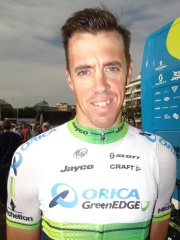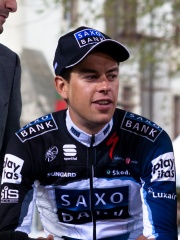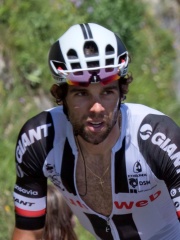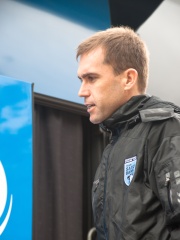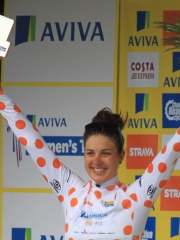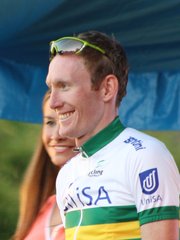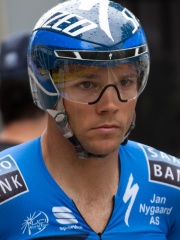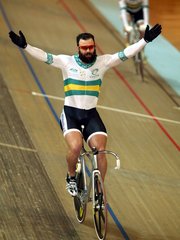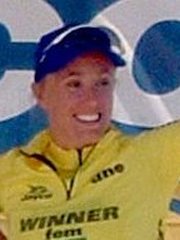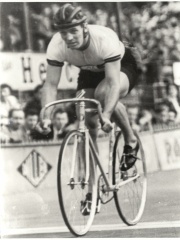
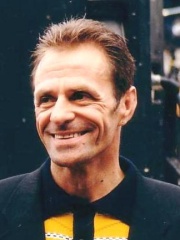
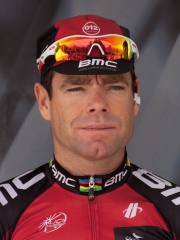
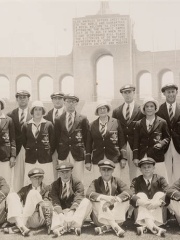
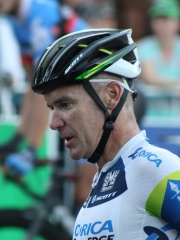
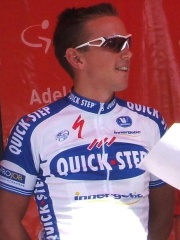
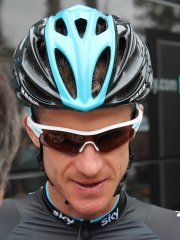
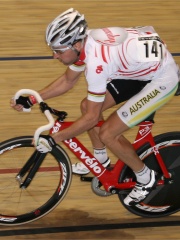
The Most Famous
CYCLISTS from Australia
This page contains a list of the greatest Australian Cyclists. The pantheon dataset contains 1,613 Cyclists, 109 of which were born in Australia. This makes Australia the birth place of the 7th most number of Cyclists behind Germany, and Netherlands.
Top 10
The following people are considered by Pantheon to be the top 10 most legendary Australian Cyclists of all time. This list of famous Australian Cyclists is sorted by HPI (Historical Popularity Index), a metric that aggregates information on a biography's online popularity. Visit the rankings page to view the entire list of Australian Cyclists.

1. Lionel Cox (1930 - 2010)
With an HPI of 58.72, Lionel Cox is the most famous Australian Cyclist. His biography has been translated into 18 different languages on wikipedia.
Lionel Malvyne Cox OAM (5 December 1930 – 9 March 2010) was an Australian Olympic track cyclist.

2. Danny Clark (b. 1951)
With an HPI of 54.88, Danny Clark is the 2nd most famous Australian Cyclist. His biography has been translated into 18 different languages.
Daniel Clark OAM (born 30 August 1951) is an Australian former track cyclist and road bicycle racer, who was a professional rider from 1974 to 1997. He won five world championships and at the 1972 Summer Olympics in Munich, West Germany, came second in the 1,000m time trial. Clark was often the fastest finishing rider in six-day races, especially as Patrick Sercu slowed after the mid-1970s. Clark and British rider, Tony Doyle, won many six-day races. He enjoyed the party atmosphere of the races, and continued to work in them as a Derny pacer after retiring.

3. Cadel Evans (b. 1977)
With an HPI of 53.84, Cadel Evans is the 3rd most famous Australian Cyclist. His biography has been translated into 46 different languages.
Cadel Lee Evans (; born 14 February 1977) is an Australian former professional racing cyclist who competed professionally in both mountain biking and road bicycle racing. A four-time Olympian, Evans is one of three non-Europeans – along with Greg LeMond and Egan Bernal – to have won the Tour de France, winning the race in 2011. Early in his career, he was a champion mountain biker, winning the UCI Mountain Bike World Cup in 1998 and 1999 and placing seventh in the men's cross-country mountain bike race at the 2000 Summer Olympics in Sydney. Evans is a four-time Olympian. Evans turned to full-time road cycling in 2001, and gradually progressed through the ranks. He finished second in the Tour de France in 2007 and 2008. Both of these 2nd place finishes are in the top 10 of the closest Tours in history. He became the first Australian to win the UCI ProTour (2007) and the UCI Road World Championships in 2009. After finishing outside the top twenty in 2009 and 2010, Evans became the first Australian rider to win the Tour de France in 2011, riding for the BMC Racing Team. He took the race lead on the penultimate day, after completing a 42.5-kilometre (26.4-mile) individual time trial some two-and-a-half minutes quicker than his closest rivals, Andy Schleck and Fränk Schleck. At age 34, he was among the five oldest winners in the race's history. He also made the podium in the 2009 Vuelta a España and the 2013 Giro d'Italia. Evans retired on 1 February 2015, after completing a race named in his honour.

4. Dunc Gray (1906 - 1996)
With an HPI of 53.66, Dunc Gray is the 4th most famous Australian Cyclist. His biography has been translated into 20 different languages.
Edgar Laurence "Dunc" Gray (17 July 1906 – 30 August 1996) was an Australian track cyclist and Olympian. Gray was born in Goulburn, New South Wales. He was called 'Dunc', which dates back to school where he was called 'Dunc' and this was later extended to 'Duncan'. He started competitive cycling with Goulburn Amateur Cycling Club around 1925. From 1926 to 1941 he won 20 Australian titles, 36 New South Wales titles, and 36 club championships. On eight occasions he was the NSW 1000m time trial and/or the 1000m sprint winner. He won a bronze medal for the 1000m time trial at the 1928 Summer Olympics in Amsterdam. This was Australia's first Olympic Games medal in cycling. At the 1932 Summer Olympics in Los Angeles he won Australia's first cycling gold in the same event, in world record time of 1m 13s. He represented Australia at the 1934 British Empire Games and won the 1000m time trial. At the 1938 British Empire Games in Sydney, he won the 1000m sprint. He was the flag-bearer for Australia at the 1936 Summer Olympics in Berlin and at the 1938 British Empire Games. In his last years, Gray lived in Kiama and supported the Olympic movement, including Melbourne's bid for the 1996 Summer Olympics and then Sydney's successful bid for the 2000 Summer Olympics. The Dunc Gray Velodrome at Bass Hill, in Sydney's western suburbs, was built for the 2000 Summer Olympics in Sydney and named after him. The Speedwell bike that Gray rode at the 1932 Summer Olympics is at the Dunc Gray velodrome. Speedwell bicycles were manufactured by Charles Bennett, a former Intercolonial Champion of Australia, who raced pennyfathings before Federation in 1901. In 1985, Gray was inducted into the Sport Australia Hall of Fame. In 2015, he was an inaugural Cycling Australia Hall of Fame inductee.
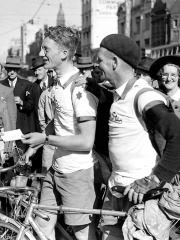
5. Russell Mockridge (1928 - 1958)
With an HPI of 52.72, Russell Mockridge is the 5th most famous Australian Cyclist. His biography has been translated into 18 different languages.
Edward Russell Mockridge (18 July 1928 – 13 September 1958) was a racing cyclist from Geelong, Victoria, Australia. He died during a race, in collision with a bus.

6. Stuart O'Grady (b. 1973)
With an HPI of 48.64, Stuart O'Grady is the 6th most famous Australian Cyclist. His biography has been translated into 26 different languages.
Stuart O'Grady (born 6 August 1973) is a retired Australian road bicycle racer, who rode as a professional between 1995 and 2013. A former track cyclist, O'Grady and Graeme Brown won a gold medal in the Men's Madison at the 2004 Summer Olympics. O'Grady also won Paris–Roubaix in 2007. O'Grady competed in the Tour de France from 1997 and contended for the points classification in the Tour de France known as the green jersey, finishing second in the 1998, 1999, 2001 and 2005 races. He wore the yellow jersey of general classification leader in 1998 and 2001. With his participation in the 2013 Tour de France, he tied George Hincapie's record of 17 participations in the Tour de France. However, Hincapie was removed from three of his 17 starts for his part in the Lance Armstrong doping scandal, and O'Grady himself admitted having been assisted by illicit erythropoietin (EPO) use at least on the 1998 Tour de France (the Dutchman Joop Zoetemelk holds the absolute records of completed Tours de France, with 16 from 1970 to 1986). He was awarded the Medal of the Order of Australia (OAM) in the 2005 Australia Day Honours "for service to sport as a Gold Medallist at the Athens 2004 Olympic Games." O'Grady is the current Race Director of the Tour Down Under.

7. Allan Davis (b. 1980)
With an HPI of 48.53, Allan Davis is the 7th most famous Australian Cyclist. His biography has been translated into 21 different languages.
Allan Howard Davis (born 27 July 1980) is an Australian former professional road racing cyclist, who last rode for UCI ProTour team Orica–GreenEDGE. Born in Ipswich, Queensland, Davis resides in Bundaberg, Queensland and in Spain. Known for his sprinting ability, he started competitive cycling at the age of 10, and turned professional in 2002. He is also the brother of fellow cyclist, Scott Davis, and was an Australian Institute of Sport scholarship holder.

8. Michael Rogers (b. 1979)
With an HPI of 48.39, Michael Rogers is the 8th most famous Australian Cyclist. His biography has been translated into 25 different languages.
Michael Rogers (born 20 December 1979) is an Australian retired professional road bicycle racer who competed professionally between 1999 and 2016, for the Mapei–Quick-Step, Quick-Step–Innergetic, Team HTC–Columbia, Team Sky and Tinkoff teams. He is a three-time World Time Trial Champion, winning consecutively in 2003 (after David Millar was stripped for doping), 2004 and 2005, and won Grand Tour stages at the Tour de France and the Giro d'Italia. In April 2016, Rogers announced via Twitter, that he was being forced to retire from professional cycling due to a congenital heart defect condition which had been worsening.

9. Luke Roberts (b. 1977)
With an HPI of 48.21, Luke Roberts is the 9th most famous Australian Cyclist. His biography has been translated into 20 different languages.
Luke Justin Roberts (born 25 January 1977) is a sports director and former Australian racing cyclist specialising in both track cycling and road bicycle racing. Born in Adelaide, South Australia, he resides both in Adelaide and in Cologne, Germany. Coming from a cycle racing family, he started competitive cycling at the age of 13, and turned professional in 2002. He was an Australian Institute of Sport scholarship holder. and a member of the Comnet Senges team (2002–2004), and of Team CSC from 2005 to 2007. As a team and individual pursuit specialist, holding an Olympic gold medal and World record with the Australian Pursuit team at the 2004 Summer Olympics, he contributes particularly to the success of his team in time trial events. In 2003 he was awarded the title of Australian Male Track Cyclist of the Year. In 2005 he was awarded the Order of Australia medal in the Australia Day Honours List. In 2002, 2003 and 2004 he was a World Champion Team pursuit, and won the silver medal in 2002 and 2003 for the World Individual Pursuit Championship. At the Olympic level, Luke Roberts has competed as part of the Australian cycling team at the 2000 Summer Olympics in Sydney and the 2004 Summer Olympics in Athens. In 2000 he came 9th in the Individual Pursuit at the Olympic Games. He improved his performance 4 years later in Athens, coming 5th in the Individual Pursuit. As part of the Australian pursuit team with Graeme Brown, Brett Lancaster, Bradley McGee, (Peter Dawson and Stephen Wooldridge were also part of the team), Roberts won gold and set a new world record for the 4000m Team Pursuit of 3mins 56.610secs, breaking their previous world record set in Stuttgart in 2003. At the 1998 Commonwealth Games, Roberts achieved a gold medal for the Teams Pursuit, a silver medal in the Individual Pursuit, and came 8th in the Points race. Four year later at the 2002 Commonwealth Games in Manchester, Roberts won gold in the Teams Pursuit and 4th in the Individual Pursuit. His 2010 road racing team, Team Milram, folded at the end of that season, and he signed to ride for a proposed Australian team known as Pegasus: this team, however, failed to obtain a UCI license. After riding with UniSA in the 2011 Tour Down Under, Roberts signed with Saxo Bank–SunGard, a continuation of the squad he was with from 2005 to 2007, for the remainder of the season.
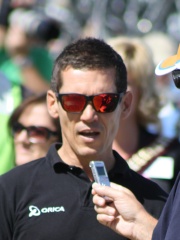
10. Robbie McEwen (b. 1972)
With an HPI of 47.69, Robbie McEwen is the 10th most famous Australian Cyclist. His biography has been translated into 32 different languages.
Robbie McEwen (born 24 June 1972) is an Australian former professional road cyclist. He is a three-time winner of the Tour de France points classification in 2002, 2004 and 2006 and, at the peak of his career, was considered the world's fastest sprinter. He last rode for Orica–GreenEDGE on the UCI World Tour. A former Australian BMX champion, McEwen switched to road cycling in 1990 at 18 years of age. He raced as a professional from 1996 until 2012. McEwen retired from the World Tour after riding the 2012 Tour of California and is now a cycling broadcast commentator on the Tour Down Under, the Tour de France, the Giro d'Italia and most of the major races for Warner Brothers Discovery networks like Eurosport, Discovery+ and Max Sports.
People
Pantheon has 109 people classified as Australian cyclists born between 1906 and 2000. Of these 109, 101 (92.66%) of them are still alive today. The most famous living Australian cyclists include Danny Clark, Cadel Evans, and Stuart O'Grady. The most famous deceased Australian cyclists include Lionel Cox, Dunc Gray, and Russell Mockridge. As of April 2024, 18 new Australian cyclists have been added to Pantheon including Wayne McCarney, Stephen McGlede, and Brett Dutton.
Living Australian Cyclists
Go to all RankingsDanny Clark
1951 - Present
HPI: 54.88
Cadel Evans
1977 - Present
HPI: 53.84
Stuart O'Grady
1973 - Present
HPI: 48.64
Allan Davis
1980 - Present
HPI: 48.53
Michael Rogers
1979 - Present
HPI: 48.39
Luke Roberts
1977 - Present
HPI: 48.21
Robbie McEwen
1972 - Present
HPI: 47.69
Mathew Hayman
1978 - Present
HPI: 47.45
Richie Porte
1985 - Present
HPI: 46.86
Brett Aitken
1971 - Present
HPI: 46.72
Michael Matthews
1990 - Present
HPI: 45.38
Bradley McGee
1976 - Present
HPI: 45.03
Deceased Australian Cyclists
Go to all RankingsLionel Cox
1930 - 2010
HPI: 58.72
Dunc Gray
1906 - 1996
HPI: 53.66
Russell Mockridge
1928 - 1958
HPI: 52.72
Dean Woods
1966 - 2022
HPI: 44.91
Melissa Hoskins
1991 - 2023
HPI: 42.83
Stephen Wooldridge
1977 - 2017
HPI: 39.73
Zak Dempster
1987 - Present
HPI: 37.71
Jonathan Cantwell
1982 - 2018
HPI: 36.68
Newly Added Australian Cyclists (2025)
Go to all RankingsWayne McCarney
1966 - Present
HPI: 43.00
Stephen McGlede
1969 - Present
HPI: 41.58
Brett Dutton
1966 - Present
HPI: 41.56
Sean Eadie
1969 - Present
HPI: 41.37
Shaun O'Brien
1969 - Present
HPI: 40.64
Gary Neiwand
1966 - Present
HPI: 40.26
Darryn Hill
1974 - Present
HPI: 39.37
Katie Mactier
1975 - Present
HPI: 38.99
Michelle Ferris
1976 - Present
HPI: 38.22
Zak Dempster
1987 - Present
HPI: 37.71
Chris Harper
1994 - Present
HPI: 36.92
Shara Marche
1987 - Present
HPI: 33.76
Overlapping Lives
Which Cyclists were alive at the same time? This visualization shows the lifespans of the 4 most globally memorable Cyclists since 1700.

